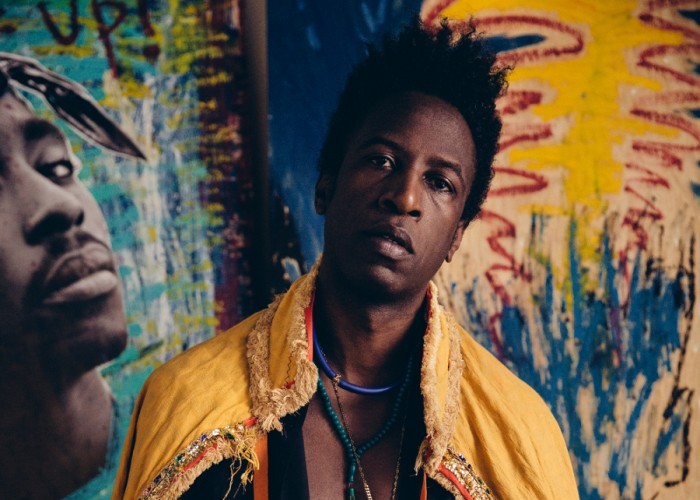Jan 13, 2026 2:09 PM
More Trump-Kennedy Center Cancellations
The fallout from the renaming of the John F. Kennedy Center for the Performing Arts to include President Donald…

Spoken word artist Saul Williams contributed to David Murray’s Blues For Memo (Motéma).
(Photo: Geordie Wood)For those introduced to hip-hop during the mid-to-late ’90s, listeners heard slam poet laureate Saul Williams introduced on 1998’s epoch-defining Lyricist Lounge, Vol. 1 compilation. Williams contributed “Ohm” to the double-disc set.
Through the years, he’s channeled his art through the harder-edged sounds of industrial and electronic music. But in 2018, the onetime Nuyorican Poet’s Café Grand Slam Champion transitioned into the realm of jazz, following in the footsteps of legends like Gil-Scott Heron and onetime DownBeat critic Amiri Baraka.
In fact, it was at Baraka’s 2014 funeral where Williams initially met saxophonist David Murray, a good friend and close collaborator of the late poet, who was moved by the younger poet’s eulogy. The connection resulted in Murray recruiting Williams to record with him in Istanbul with legendary Turkish producer Ahmet Ulug, who commissioned an album to be created in honor of his late brother Mehmet, an impresario and club owner on the local jazz scene who was lovingly known as “Memo.”
The resulting Blues For Memo (Motéma) is indeed a beautiful homage to a beloved figure of the European and Middle Eastern jazz communities. Joining together in the spirit of Baraka and Mehmet, the recording is a deep, politically charged invocation of the blues, assisted by an all-star lineup of players including pianist Orrin Evans, bassist Jaribu Shahid and drummer Nasheet Waits along with guest contributions from Pervis Evans on vocals, Jason Moran on Fender Rhodes, Aytaç Doğan on kanun and Murray’s son, Mingus, on guitar.
DownBeat had the opportunity to speak with Williams, who was on his way to soundcheck in Salzburg, Switzerland, ahead of a show with Murray, about the new turn in his career.
The following interview has been edited for length and clarity.
How far back do you go with jazz as a listener?
I remember when Branford Marsalis was doing shit with DJ Premier as Buckshot LeFonque. Then there was Guru’s Jazzmatazz. And then we also had the Brand New Heavies, as well as all that acid jazz coming out of London. But my ear was tuned more toward electronic music, because that’s where I felt I had fit in.
Even now, a lot of what I love is still in the realm of electronic music, but elements of jazz can live so thoroughly within that realm. For me, jazz was the learning ground. That’s what I’m doing when I’m on tour with [Murray and his band]. I’m in school.
For many hip-hop fans, your work introduced them to industrial and electronic sounds.
For me, the yardstick was Tricky. And through him, I’d get turned onto so much shit from Bristol and from England; I spent most of the ’90s trying to stay on top of that shit. Then, eventually, I’d start following the samples guys like Premier and Pete Rock would use and get into where all of it came from.
Even if I was doing drums and programming things that were electronic, I’d make sure to incorporate the elements of jazz I had been picking up.
What were some of the first jazz recordings you picked up on?
I used to get off so hard on John Coltrane’s soprano sax playing on, say, “My Favorite Things” or “Chim Chim Cheree.” And I couldn’t figure out why it was so uplifting to me.
Then I remembered the first time I heard house music, and I was like, OK, there’s something about these highs. It also crosses over into an appreciation for classical music as well. You know, the way that Björk will make you go, “Holy fuck, I need to hear more cello.”
You heard that Alice Coltrane album that came out last year? That was one of my favorites of 2017. It is an instant classic.

Belá Fleck during an interview with Fredrika Whitfield on CNN.
Jan 13, 2026 2:09 PM
The fallout from the renaming of the John F. Kennedy Center for the Performing Arts to include President Donald…

Peplowski first came to prominence in legacy swing bands, including the final iteration of the Benny Goodman Orchestra, before beginning a solo career in the late 1980s.
Feb 3, 2026 12:10 AM
Ken Peplowski, a clarinetist and tenor saxophonist who straddled the worlds of traditional and modern jazz, died Feb. 2…

The success of Oregon’s first album, 1971’s Music Of Another Present Era, allowed Towner to establish a solo career.
Jan 19, 2026 5:02 PM
Ralph Towner, a guitarist and composer who blended multiple genres, including jazz — and throughout them all remained…

Rico’s Anti-Microbial Instrument Swab
Jan 19, 2026 2:48 PM
With this year’s NAMM Show right around the corner, we can look forward to plenty of new and innovative instruments…

Richie Beirach was particularly renowned for his approach to chromatic harmony, which he used to improvise reharmonizations of originals and standards.
Jan 27, 2026 11:19 AM
Richie Beirach, a pianist and composer who channeled a knowledge of modern classical music into his jazz practice,…